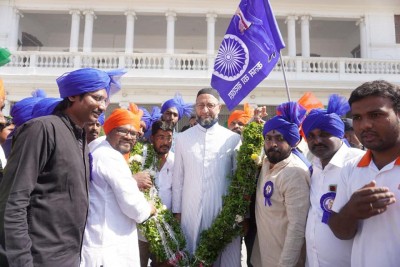Hyderabad, Dec 16 : Even as the Majlis-e-Ittehadul Muslimeen (MIM) is coming under flak from its opponents for acting as ‘vote cutter’ in states like Bihar, Uttar Pradesh and West Bengal, it sought to send a strong message to them that when it comes to secularism, it believes in walk the talk.
Often at the receiving end for its alleged communal politics and for the word ‘Muslim’ in its name, the party led by Hyderabad MP Asaduddin Owaisi fielded five non-Muslim candidates in the recent elections to the Greater Hyderabad Municipal Corporation (GHMC).
Three of them were elected — K. Tara Bai (Falaknuma), S. Raj Mohan (Puranapul) and Mandagiri Swamy (Karwan). The three divisions fall under the traditional strongholds of the party.
MIM, a dominant force in Hyderabad politics, won 44 seats in the 150-member GHMC, repeating its 2016 performance.
In the previous elections, four Hindu candidates had won on MIM ticket. This time the party could not retain the Jambagh division, where its candidate D. Mohan was victorious in the 2016 polls.
Interestingly, in Puranapaul division, MIM’s Hindu candidate defeated Congress’ Muslim candidate for the second time in a row.
However, the party’s move to field non-Muslims in five divisions had more significance this time as the party is under attack from the Congress and others for allegedly dividing secular votes in other states, thus helping the BJP in the process.
Unfazed by the criticism, the party is determined to have pan-India presence and is joining hands with like-minded forces to contest the polls in various states.
Political analysts said that by fielding non-Muslims, and that too in divisions having strong winning prospects for the party, the MIM has shown its sincerity as it is forging alliances with Dalit groups in different states.
The shrill campaign for the GHMC polls saw BJP aggressively campaigning with the Hindutva agenda with its leaders raking up controversial issues like renaming Hyderabad as Bhagyanagar and alleged illegal immigrants living in the old city and describing Owaisi as the new Jinnah.
Countering BJP’s campaign, Owaisi had highlighted the ‘real secularism’ practiced by his party. “We have given ticket to Raj Mohan for the fourth time. We have fielded five non-Muslims. This is our secularism,” the MIM chief had said.
Owaisi had said that Raj Mohan had tears in his eyes when he called on the Hyderabad MP to express his gratitude after MIM leader in Telangana Assembly, Akbaruddin Owaisi, demanded the state government to release Rs 10 crore for the Mahankali temple at Lal Darwaza in the old city. He recalled that even temple priests had called on Akbaruddin Owaisi to thank him.
“Muslims, Hindus, Dalits, Sikhs… all live in peace and harmony in the old city. We don’t do work by asking their names and religion,” Asaduddin Owaisi said.
MIM leaders say that people, irrespective of their religion and caste, come to the party headquarters Darussalam, where MPs, MLAs, MLCs and corporators sit everyday to solve their problems.
They claim that MIM always sets the example for other so-called secular parties by practicing secularism in its real sense.
It was way back in 1980s when Hyderabad was gripped by frequent communal tensions and curfews that the MIM nominated three non-Muslims as mayors and two as deputy mayors.
K. Prakash Rao, A. Satyanarayana and Allampally Pchaiah were the three mayors from MIM between 1986 and 1991. The party also nominated M.B. Shivraj and Hanmanthu as deputy mayors.
The party also fielded non-Muslims, mainly Dalits, in the elections to the local bodies in other parts of Telangana and in neighbouring Maharashtra. Six non-Muslims were among 100 of its candidates elected to the local bodies in Telangana last year.
It also allotted tickets to non-Muslims in the local body polls in Maharashtra.
Last year, MIM had won 24 seats in the 115-member Aurangabad Municipal Corporation. The party had fielded 13 non-Muslims and five of them were elected.
The MIM was founded 1927 to promote the socio-economic and educational development of Muslims. After Hyderabad state’s accession to the Indian Union in 1948, the organisation was banned.
However, in 1958 it was revived with a new constitution by Moulana Abdul Wahid Owaisi, the grandfather of Asaduddin Owaisi. A well-known lawyer in those days, Abdul Wahid Owaisi converted MIM into a political party to fight for the rights of the minorities as enshrined in the Indian Constitution.
MIM’s vision says it is dedicated to protect and promote the rights of Muslims, Dalits, Adivasis, Other Backward Classes, other minorities and all other underprivileged communities in India.
The party made its electoral debut in 1959, winning two municipal by-elections in Hyderabad. In 1960, it emerged as the main opposition party in Hyderabad.
Abdul Wahed Owaisi’s son Sultan Salahuddin Owaisi was among the party leaders elected to the then Municipal Corporation of Hyderabad (MCH).
Salahuddin Owaisi, who was first elected to the Assembly in 1962 and later to the Parliament, strengthened the party to make it a dominant force in Hyderabad politics.
After Salahuddin Owaisi’s death in 2008, his eldest son Asaduddin Owaisi took over the mantle of leadership and under him the party spread its wings in other states.
MIM, which has been winning the Hyderabad Lok Sabha seat since 1984, also added Aurangabad to its kitty last year. It has seven MLAs in Telangana, two in Maharashtra and recently won five seats in the Bihar Assembly polls.
Disclaimer: This story is auto-generated from IANS service.

